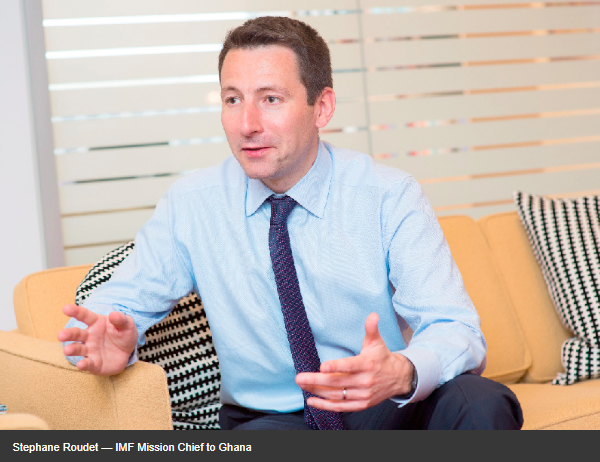
The International Monetary Fund (IMF) has said that it is not part of ongoing discussions with the government and Ghana’s creditors to restructure its debt. It said the nature of such negotiations were purely the decisions of the country.
The country requested support from the fund in July this year after strong debt build-up combined with large deficits to heighten inflation and currency depreciation, resulting in the loss of market access for borrowing.
To bring the debt to sustainable levels, the government said it was in discussions with creditors on the way forward.
In a question (Q) and answer (A) published on its website on November 30, which has been republished below, the IMF stated its position on the matter, as well as shed more light on the status of the IMF negotiations and the way forward.
Q: What is the status of discussions with Ghana for an IMF-supported economic reform programme? What is the possible timing for an agreement?
A: The IMF has been engaging with the Ghanaian authorities on their post-COVID programme for economic growth and reform and associated policies and reforms that could be supported by a new IMF lending arrangement.
Following several rounds of discussions between IMF staff and Ghanaian authorities in Accra and Washington, DC, an IMF team will visit Accra from December 1–13 to make further progress towards reaching an agreement as soon as feasible.
Q: Why is Ghana requesting an IMF programme?
A: Ghana’s fiscal and debt vulnerabilities worsened fast amid an increasingly challenging external environment. During the COVID-19 pandemic, Ghana’s public debt increased significantly.
At the same time, the government’s efforts to preserve debt sustainability were not seen as sufficient by investors, leading to credit rating downgrades, the exit of non-resident investors from the domestic bond market, and ultimately Ghana’s loss of access to international capital markets.
These adverse developments, further exacerbated by price and supply-chain shocks from the war in Ukraine, have led to a large exchange rate depreciation, a surge in inflation (40.4 per cent year on year in October) and pressure on foreign exchange reserves.
Against this backdrop, the government requested assistance from the IMF in July. Discussions between IMF staff and the Ghanaian authorities have been ongoing since then.
An IMF-supported programme would support Ghana in implementing policies that restore macroeconomic stability and ensure debt sustainability while protecting the most vulnerable parts of its population.
It would help to create the conditions for inclusive and sustainable growth and job creation.
Such a programme would also help strengthen policy credibility, alleviate exchange rate pressures, and provide a catalytic effect on additional sources of financing.
Q: What type of programme is Ghana eligible for? How much is Ghana seeking?
A: We are discussing with the authorities on the type of IMF facility that best fits Ghana’s needs.
The fund’s various lending instruments are tailored to different types of balance of payments (BOPs) needs and the specific circumstances of a member country. See the IMF Lending webpage for more.
The previous arrangement with Ghana was a three-year extended credit facility (ECF) from 2015-2018, which was extended to April 2019.
However, since negotiations are ongoing, it is premature to comment on the final form the latest financing programme will take.
The IMF Executive Board will decide the level of access (credit amount) and the final programme design.
Q: What will be the objectives of an IMF programme with Ghana?
A: The goal of the government’s economic programme, which would be supported by IMF financing, is to restore macroeconomic stability and ensure debt sustainability, support the credibility of government policies, restore confidence in the central bank’s ability to manage inflation and rebuild foreign exchange reserve buffers to make the economy more resilient to shocks.
Specifically, in the fiscal sector, an important policy objective would be to increase revenues, critical for debt sustainability while safeguarding spending on health, education and social protections.
Q: Does Ghana need debt restructuring? When will a new debt sustainability assessment (DSA) be published?
A: When an IMF member country requests financing, the fund assesses whether the country’s policies are consistent with debt sustainability.
This assessment is based on a DSA conducted jointly by the IMF and World Bank to determine whether the the government is able to meet all its current and future payment obligations.
It’s a forward-looking exercise that needs to take into account the authorities’ policies.
The last DSA published in the 2021 Article IV Staff Report concluded that: “Public debt was sustainable conditional on a rigorous and credible implementation of the authorities’ medium-term consolidation plan to put debt on a declining trajectory and ensure continued market access”.
In their recent 2023 budget statement, the authorities have assessed their public debt as being unsustainable over the medium term.
Together with efforts to bring the government deficit down, they have announced their intention to conduct a debt operation to ensure debt sustainability.
We welcome the authorities’ intentions to implement policies that will ensure the sustainability of public finances.
However, the nature of engagements and debt operations between Ghana and its creditors are sovereign decisions.
Q: Will the programme result in a cut in social programmes?
A: Protecting the vulnerable is a core objective of IMF programmes.
In general, IMF-supported programmes seek to boost social spending to improve socioeconomic outcomes and help promote inclusive growth. It is important that social spending measures be adequate, efficient and financed sustainably to achieve this.
Source: graphic.com.gh























